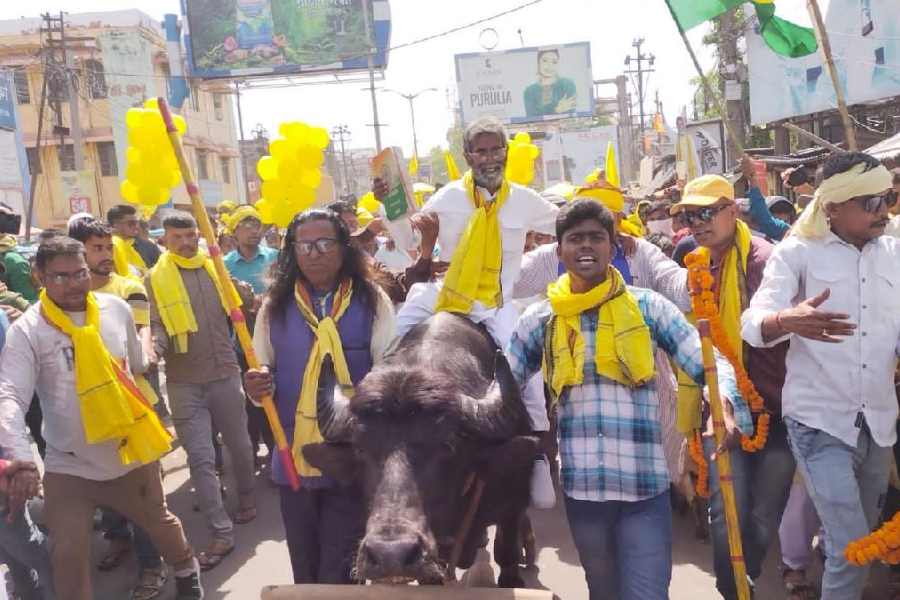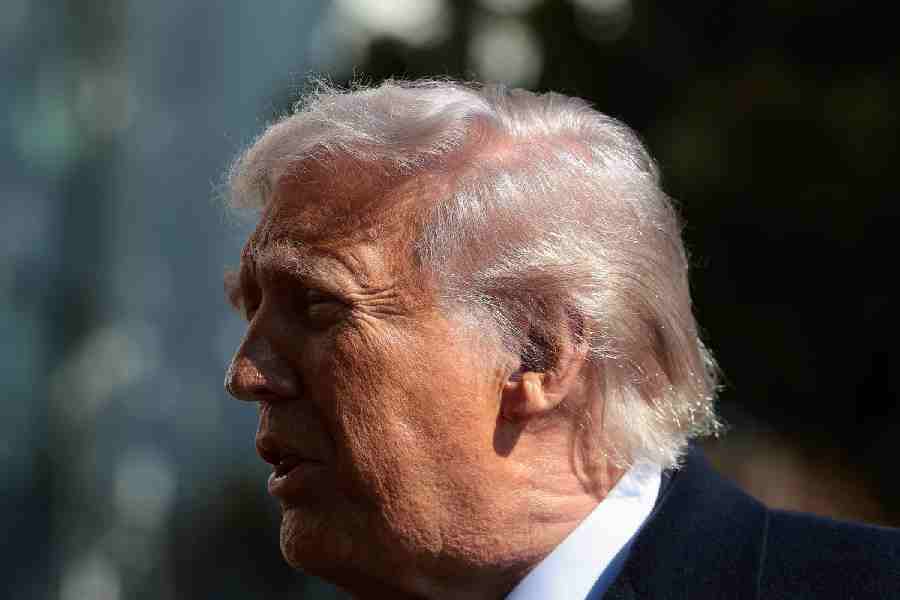Subodh Chandra Mahato was a BJP booth president in Purulia’s Manbazar until last year. In last year’s panchayat election, his daughter-in-law, Jhumpa Mahato, unsuccessfully contested as a BJP zilla parishad candidate from the area.
After five years of association with the saffron camp, the 55-year-old farmer is now campaigning for Adivasi Kurmi Samaj candidate and chief adviser of the outfit, Ajit Prasad Mahato, in the Lok Sabha polls. He is confident that Ajit Prasad will get a handsome lead in his region and will defeat both the BJP and the Trinamool Congress.
“I did a lot for the BJP in the last five years. We helped the BJP win in 2019 with a huge margin of over two lakh votes, hoping the party will keep their promise to grant us Scheduled Tribe status. But they did nothing for us. This time, I am putting my efforts into ensuring victory for a candidate who is not from any political party but
from our community,” said Subodh Chandra.
“If Ajit Prasad wins, he will fight in Parliament for our long-standing demand for ST status,” he added.
Like Subodh, dozens of micro-level BJP leaders have switched their political allegiances to the candidates of their community in this crucial election in Purulia. This has left the BJP in distress, as Kurmi voters played a pivotal role in sweeping the saffron camp to victory in five out of six Jungle Mahal seats in the 2019 general elections. The four western districts — Purulia, Bankura, Jhargram, and West Midnapore — are collectively known as Jungle Mahal.
In Purulia, Kurmis constitute around 60% of the electorate, while they make up 30%, 18%, and 15% in Jhargram, Bankura, and West Midnapore, respectively.
Realising the significance of Kurmi electors, the BJP successfully exploited identity politics in Jungle Mahal and relied on the Kurmi community to defeat the ruling Trinamool in the region in the 2019 elections when the saffron camp bagged 18 of the 42 Lok Sabha seats in Bengal.
It is believed that the victory of BJP’s Purulia candidate, Jyotirmoy Singh Mahato, by a margin of 2 lakh votes was possible because the Kurmis, who have the highest presence in the region in Bengal, voted en masse for the saffron camp.
In this election, the Adivasi Kurmi Samaj, the apex body of the Kurmi community, has fielded four candidates in Purulia, Bankura, Midnapore, and Jhargram — all seats where the BJP won in 2019. In Jhargram, a Kurmi candidate from another organisation has joined the poll fray.
Though the Adivasi Kurmi Samaj claimed they were contesting the election to represent their community after being disillusioned by the BJP-led Union government and Mamata Banerjee’s state government, BJP leaders believe these Kurmi nominees are contesting to help Trinamool in the polls.
“Here in Jhargram, your candidate Surya Singh Besra recently said that he wants to see Mamata Banerjee as Prime Minister. Ajit Mahato in Purulia is contesting to help the Trinamool by cutting into the BJP’s votes,” Bengal’s leader of the Opposition Suvendu Adhikari said at a rally in Jhargram last week.
Kurmi outfits, including the Samaj, have blocked roads and railway tracks multiple times over the past two years, demanding ST status and accusing state and central governments of avoiding a solution due to political compulsions. Their members said they were listed as ST until 1931 but were excluded for “unknown reasons” after Independence. Currently, the Kurmis are tagged as OBCs.
A section of the Kurmi community was so aggrieved that in May last year, a
group of people attacked forest minister Birbaha Hansda while she was travelling as part of TMC’s national general secretary Abhishek Banerjee’s convoy.
Hansda said it was the BJP that provoked the Kurmis against the tribals in Jungle Mahal for their political gains, and in this election, the saffron camp’s strategy had backfired.
“It was the BJP that played the card of identity politics for electoral advantage in 2019. As the Kurmi community has fielded their own candidates this time, the BJP’s identity politics strategy has backfired,” said Hansda, the state forest minister and Jhargram MLA.
Apart from the Kurmis, the BJP exploited identity politics in 2019 by reaching out to various other communities, including Scheduled Castes and Scheduled Tribes, who also helped the saffron camp reap political dividends in Jungle Mahal until the 2021 Assembly polls.
Although Trinamool recovered its lost foothold in various Assembly segments, a significant part of Jungle Mahal remained with the saffron camp in the election that brought Mamata to power for the third consecutive time in 2021.
Out of 40 Assembly seats in the four Jungle Mahal districts, Trinamool won 24. However, the BJP’s hegemony persisted in two districts, Bankura and Purulia.
In this election, the Trinamool has tried to counter the BJP’s identity politics by reaching out to communities such as Bhumij, Munda, Bauri, Bagdi, and Doms. In March this year, just before the Lok Sabha polls were announced, Mamata held a meeting with members of various communities in north Bengal, while her nephew Abhishek Banerjee conducted a meeting with 3,500 SC and ST leaders from across Bengal.
The meetings of the two top Trinamool leaders indicated that the ruling dispensation would exploit identity politics heavily in these elections.
A Trinamool source said the party had been conducting regular meetings with different communities separately in various villages of Jungle Mahal.
“Jungle Mahal has a very complex political equation because of conflicts between the tribals and the Kurmis over the ST tag. There are dozens of small community groups like Santhal, Sabar, and Mundas. The party appointed a group of senior leaders to woo those communities separately, and it is apparent that the effort was successful,” said the source.
The jury is still out. The verdict will be known on June 4.
Purulia and Jhargram vote today











